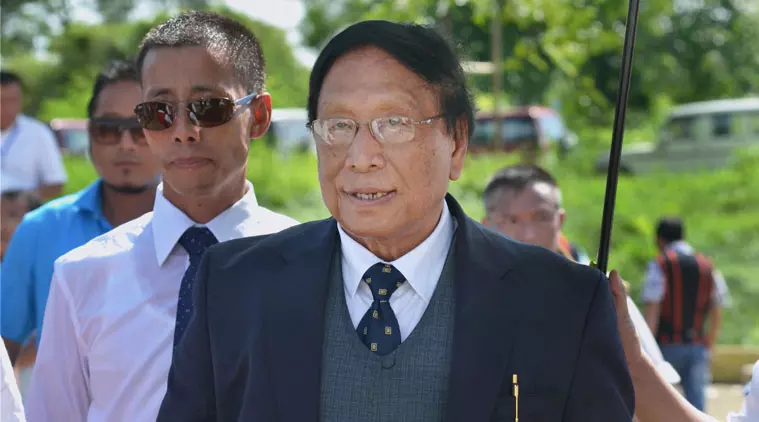
NSCN-IM supremo Muivah's proposed Manipur visit sparks fresh unease
The 91-year-old leader plans a week-long visit to his native village Somdal, Ukhrul, amidst volatile ethnic tensions and fears over 'Greater Nagalim' demand

The proposed visit of Thuingaleng Muivah, supremo of the National Socialist Council of Nagaland (Isak-Muivah) (NSCN-IM) faction, to Naga-inhabited areas of Manipur has emerged as the latest flashpoint in the state’s increasingly complex ethno-political landscape.
According to sources, the outfit's supremo plans to visit his native village, Somdal, in the Ukhrul district on October 22. During his weeklong stay, the 91-year-old leader is expected to address at least two public meetings in Naga-dominated districts. As per the tentative schedule, one rally will be held in Ukhrul on October 22 and another in Senapati on October 29.
Aslo Read: Nagaland, Assam CMs agree on joint action in 'Disputed Area Belt'
Muivah's visit to ancestral village
Muivah’s return to his ancestral village after five decades carries heavy symbolic and political weight.
His presence could reignite tensions in Manipur’s already delicate balance of power, where the interests of the Naga, Kuki, and Meitei communities have long intersected, and often clashed, over territory, identity, and autonomy.
In the past, Muivah’s attempt to visit his birthplace stirred controversy. In 2010, the Congress-led state government under Chief Minister Okram Ibobi Singh blocked his proposed trip to Somdal, arguing that such a visit could disturb communal harmony. However, it sparked widespread protests, including a prolonged blockade of highways by Naga groups, effectively isolating the state for several days.
This time, the political landscape is markedly different. Manipur is under President’s Rule following months of ethnic unrest, and the state administration is taking a far more cautious approach. While no official statement has been made yet regarding the visit, sources in the government told The Federal that the situation is being closely monitored, and security agencies have been placed on high alert.
Also Read: Nagas grow impatient as Manipur pushes peace issue out of Centre’s priority list
'Volatile situtation in Manipur'
“This time, the situation in Manipur is far more volatile than it was in 2010. The state is already grappling with one ethnic conflict. Opposing Muivah’s visit now could be counterproductive,” a senior security official said.
He further stated that any mishandling, whether in terms of optics or on-the-ground security, could reopen old wounds and further strain inter-community relations.
The timing and political messaging of the visit amidst ongoing ethnic tensions in the state assumes significance given the NSCN (IM)’s demand for the creation of “Greater Nagalim,” a territorial claim that includes Naga-inhabited areas of Manipur, Assam, Arunachal Pradesh and the present state of Nagaland.
In Naga-majority areas of Manipur, the visit is being seen as a reaffirmation of the NSCN (IM)’s continuing influence. The group has led the Naga movement for autonomy and the unification of contiguous Naga territories since the 1980s, and Muivah remains one of its most prominent figures.
Also Read: Centre urged to merge two pacts to solve Naga issue
'No ordinary homecoming'
“This is no ordinary homecoming. Muivah’s return is steeped in symbolism,” said a valley-based legislator who declined to be named due to the sensitive nature of the issue.
In Naga-dominated areas of Manipur, quiet preparations are reportedly underway for the visit, though the NSCN (IM) has yet to release a formal itinerary. Sources close to the group suggest that while the visit is intended to remain low-profile, it holds deep emotional and political resonance for the local Naga population, many of whom continue to see Muivah as a living embodiment of their collective political aspirations.
Also Read: Naga conflict: NSCN-IM warns of 'armed conflict'
Unease among Meitei and Kuki
While no official objections have been raised so far, Muivah’s proposed visit sparked quiet unease in Manipur’s Meitei-dominated valley and Kuki-inhabited hill areas.
Muivah, who had been leading one of Southeast Asia’s longest-running insurgencies, had for decades operated from overseas bases in cities such as Bangkok, Amsterdam, and Davos. He is currently based at the NSCN (IM)’s headquarters, Hebron, located near Dimapur, Nagaland’s commercial hub, approximately 210 kilometers from Ukhrul.
The NSCN (IM) entered into a ceasefire agreement with the Government of India in 1997, aiming to reach a “negotiated settlement” to the long-standing Naga political issue. Since then, more than 600 rounds of talks have taken place between the two sides, though a final agreement remains elusive.
While the detailed contents of the negotiations have not been officially disclosed by either party, it is understood that the NSCN (IM) has stepped back from its earlier demand for the full integration of all Naga-inhabited areas across Northeast India. Instead, the group is reportedly seeking a broader territorial arrangement, akin to a regional territorial council, for Naga areas located outside the state of Nagaland.
However, any such move towards a separate administrative arrangement has been viewed with unease in sections of the Meitei-dominated Imphal valley, where there are underlying concerns that it could eventually pave the way for the bifurcation of Manipur.
At present, talks remain deadlocked over the NSCN (IM)’s demand for a separate flag and constitution for the Nagas. In addition, the issue of administrative arrangements for Naga-inhabited regions beyond Nagaland remains a major sticking point, according to sources familiar with the negotiations.
Meitei groups largely want to preserve Manipur’s territorial integrity and strongly oppose any moves that could lead to the division of the state, while Kukis lay claim to territories that overlap with Naga assertions, particularly in districts like Kangpokpi and Chandel.
As the visit approaches, both communities are likely to watch closely, particularly to hear what Muivah may say regarding the contentious Naga demand for territorial integration and the broader, unresolved ethnic issues that continue to divide the state.

